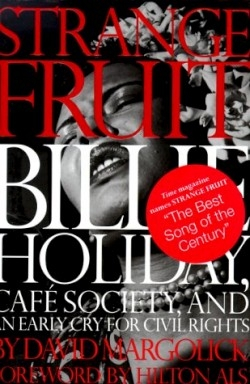Strange Fruit
Billie Holiday Caf Society and an Early Cry for Civil Rights
Southern trees bear a strange fruit,/Blood on the leaves and blood at the root,/Black body swinging in the Southern breeze,/Strange fruit hanging from the poplar trees.
Margolick’s book is a biography of this song, “Strange Fruit,” written by Abel Meeropol, a Jewish man in New York City in the early 1930s, and brought to wide public attention by jazz singer Billie Holiday. This history covers the inception of “Strange Fruit” to its influence on contemporary musicians and the public at large, focusing mainly on its role in Holiday’s repertoire.
Holiday first sang the graphic anti-lynching song in 1939 at Café Society, the legendary Greenwich Village nightclub with a clientele consisting largely of people to the far left of the political spectrum. With a pinpoint spotlight illuminating her quiet face, Holiday would bring all activity and conversation to a standstill as she sang the haunting words of “Strange Fruit” with subtle intensity.
Josh White, a contemporary of Holiday, probably popularized the song as much as she did since his career spanned more time and he sang it often. White had a tendency to over-dramatize his presentation of this stark song, however, and his own biographer, Elijah Wald, once compared his performance to Holiday’s by saying, “when Josh sings it, you feel you’re hearing a great performance. When Billie sings it, you feel as if you’re at the foot of the tree.”
Holiday sang the song only for audiences that she felt would be sufficiently appreciative of its message, and she always saved it for last. She demanded absolute respect for the song that legendary record producer Ahmet Ertegun called “the beginning of the civil rights movement.”
Margolick’s history of “Strange Fruit,” which includes a discography, touches not only on who sang the song, but the various social groups it impacted and their collective reactions to it. Beside the obvious connections it has to Blacks and Whites in America, Jewish listeners and gays and lesbians also identify with the persecution and brutal violence portrayed in the song.
The strength of this book is that it shows so many aspects to this one song and also covers the many facts and myths surrounding Holiday’s relationship with it. Anyone interested in music history or the civil rights campaign will find a great deal of interesting information in this biography.
Reviewed by
Christine Canfield
Disclosure: This article is not an endorsement, but a review. The publisher of this book provided free copies of the book to have their book reviewed by a professional reviewer. No fee was paid by the publisher for this review. Foreword Reviews only recommends books that we love. Foreword Magazine, Inc. is disclosing this in accordance with the Federal Trade Commission’s 16 CFR, Part 255.

